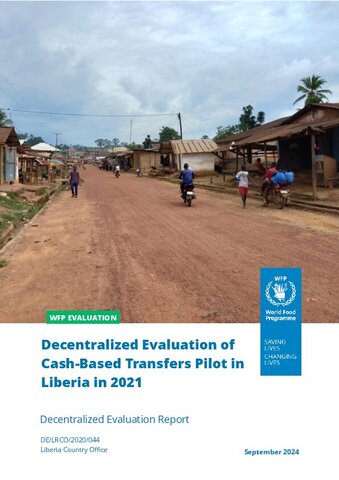
The evaluation was commissioned to help WFP better understand and learn from the planning for and implementation of different CBT modality and delivery response options in a small, under-resourced CO, such as Liberia and to evaluate the extent of WFP’s readiness to implement good practice, appropriate CBT interventions at-scale in Liberia, with a focus on learning and identifying areas for improvement.
Overarching evaluation questions focused on:
- To what extent has WFP Liberia demonstrated readiness and capacity to assess and select CBT modality and delivery mechanism response option packages that are beneficiary and contextually relevant? RELEVANCE & COHERENCE
- To what extent has WFP Liberia demonstrated readiness to implement and monitor CBTs in ways that are effective? EFFECTIVENESS
- To what extent has WFP Liberia demonstrated sustainable capacity to assess, design, implement and monitor CBT to a high standard in the future? SUSTAINABILITY & ACCOUNTABILITY TO AFFECTED POPULATIONS
The evaluation covered a pilot intervention of providing school feeding related take-home rations (THR) via CBT to vulnerable students and their families. The pilot was intended to enhance the capacity of the CO to provide CBT at scale by improving its capacities to implement CBT across all its operations; and to use the pilot as a model for scale up beyond the school feeding programme; and to test two delivery mechanisms: mobile money transfers (MMT) and electronic value vouchers (e-Vouchers).
Key evaluation findings included:
Relevance & Coherence:
- The THR pilot was relevant to Liberia’s context and aligned with national policies, but there were missed opportunities due to weak coordination with local actors, leading to confusion among schools and beneficiaries.
- The design and targeting were relevant but suffered from limited consultation, causing misunderstandings and flaws in selecting vulnerable households, with some children moving to targeted schools.
- Tools and guidance were used effectively, though programming quality was impacted by issues like unclear objectives and poor communication with stakeholders.
Effectiveness:
- While WFP systems were used well and beneficiaries appreciated the assistance, many faced challenges with targeting and receiving entitlements. Local actors reported dissatisfaction with several aspects of the program's implementation.
- The transfer value didn’t adjust for price changes, reducing its effectiveness.
Accountability & Sustainability:
- Accountability mechanisms were insufficient, with feedback not properly addressed, leaving issues unresolved.
- The pilot improved CBT capacities, but gaps in communication and understanding remained, highlighting the need for further evaluation before scaling up.
Key recommendations from the evaluation included:
- Establish strategic coherency by clarifying programming logic and purpose and re-examining contextual vulnerabilities.
- Ensure better alignment with CBT good practice around transfer values, registration, CBT communication, and coordination.
- Improve communications to communities as-a-whole.
- Continue CBT Readiness Efforts.
- Improve Accountability to Affected Populations; undertake feasibility assessments of wide-ranging response and modality and delivery mechanism options and include more local knowledge in assessment and design decisions and throughout the programme.
- Assess and improve corporate guidance capacities and gaps; make use of existing capacities and build those needed to fill remaining gaps.
- Improve feedback and complaints mechanisms.
- Improve quality and understanding of targeting and selection based on gender and vulnerability; ensure its logic is in line with programme objectives.
- Improve monitoring, evaluation, accountability, and learning (MEAL).
